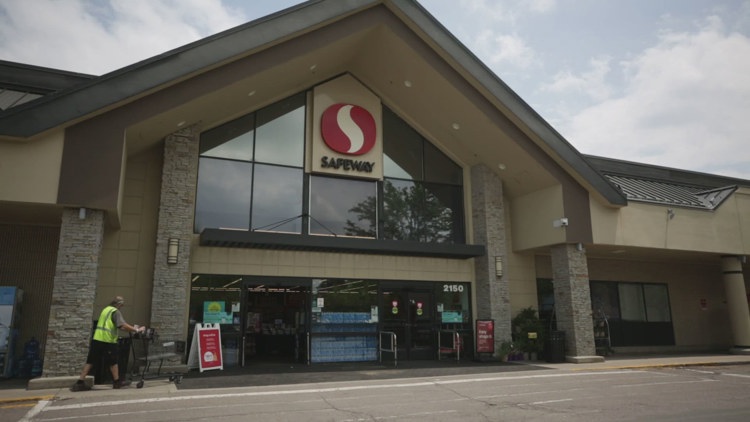There’s a chance King Soopers and Safeway workers both could strike by next week

If union leaders don’t agree with a proposal from Safeway executives this weekend, workers at Safeway stores across Colorado could strike next week.
Their potential strike comes as the union representing them sits down for negotiations with Safeway’s competitor Kroger, the parent company of King Soopers. Sunday marks the end of an extended 100-day strike stand down following a brief work stoppage in February. If a deal isn’t reached this weekend, King Soopers workers could hit the picket lines next week as well.
Though the leader of the union said she hopes that isn’t the case.
“I want to make sure consumers have a place to shop,” UFCW Local 7 president Kim Cordova told 9NEWS Consumer Investigator Steve Staeger.
The Safeway strike vote comes as workers there have been working under an extension of a contract that expired in January. Cordova accused the company of recently backing away from a signed agreement that would have provided employees retroactive pay dating back to January according to any terms of a new agreement.
Since the workers continue under a contract extension with a no-strike clause, they would be required to provide the company with 72 hours' notice of their intent to end the contract extension and begin a strike, Cordova told 9NEWS. She said the union gave Safeway until noon Friday to agree to a proposal. She said she hadn’t yet returned a phone call to Safeway Albertsons brass around 3 p.m. Friday.
In a statement to 9NEWS, Safeway Albertsons said it remains committed to productive conversations with the union and insists all stores are open.
Cordova accused Safeway Albertsons of colluding in negotiations with their competitor King Soopers, repeating allegations in a lawsuit filed against the companies by the Colorado Attorney General last year that attempted to stop a proposed merger between the national grocery giants.
Leaders from King Soopers have a scheduled negotiation with UFCW Local 7 on Saturday and Sunday and the company seems positive about the negotiations.
"We are encouraged by the progress made at the table last week, resulting in tentative agreements on several contract language items and the extension of the Peaceful Resolution Agreement,” King Soopers spokeswoman Jessica Trowbridge told 9NEWS earlier this week. “We are eager to return to the table on Saturday and Sunday and remain committed to reaching a fair agreement that provides competitive pay, affordable healthcare and long-term stability for our associates and the communities we serve. We are hopeful that productive conversations will continue this weekend resulting in an offer for our associates to vote on."
A continued potential for strikes
King Soopers workers have twice picketed over contract negotiations since the COVID pandemic. Prior to that, the last time King Soopers workers carried out a strike was 1996, coincidentally the last time Safeway workers authorized a strike as well.
But more frequent strikes for the two companies could be possible because of the consolidation of and new competitive nature of the grocery business, according to University of Denver business professor Jack Buffington.
“These unionized supermarkets are always chasing Walmart when it comes to scale and price,” Buffington said. “So that's going to continue to put pressure on the workforce, which is going to, I think, continue to lead to potential for strikes. I don't see how this changes.”
In both negotiations, Cordova said workers are fighting reductions in pension and healthcare benefits, and arguing for increased staffing to lessen the ever-growing load on grocery store employees.
Cordova noted her union has found pricing discrepancies caused by understaffing — a recent plea by the unions prompted an investigation by our partners at Consumer Reports and other news outlets that found prices at the register often don’t match prices marked on store shelves.
But Buffington said pressures to reduce overhead in an industry with tight margins will make staffing arguments a tough sell.
“The workers are concerned about those pressures from the store and trying to reduce their number of people who work at a store, reducing their health care costs and pensions, which has been something that's been rumored as a part of negotiation,” Buffington said.
“I don't think negotiations are going to impact the number of workers, because they just can't afford it with their operating margins.”
Buffington said unionized grocers are between a rock and a hard place.
“On one side they're in between like a Walmart, which is, you know, the super behemoth low-cost provider,” he said. “And on the other side, which is the hard place, is the whole Amazon, Whole Foods model, which is more convenience, more selection, you know, buying things online, so you know, so you know, they're kind of lost.”
Steve Staeger is the consumer investigator for 9NEWS. If you have a tip for Steve On Your Side, send an email .
Post a Comment